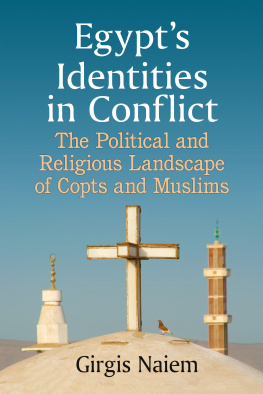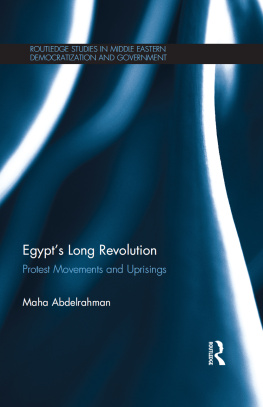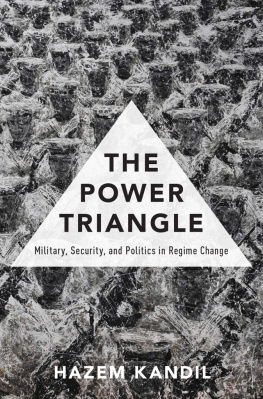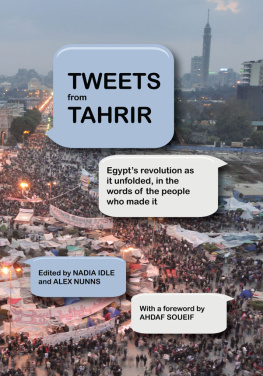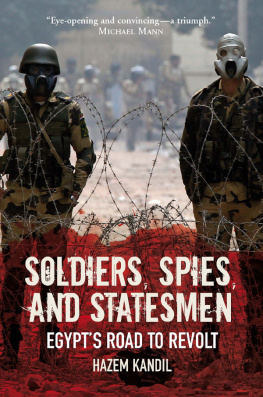Kandil - Soldiers, spies, and statesmen: Egypts road to revolt
Here you can read online Kandil - Soldiers, spies, and statesmen: Egypts road to revolt full text of the book (entire story) in english for free. Download pdf and epub, get meaning, cover and reviews about this ebook. City: Ägypten;Egypt, year: 2014, publisher: Verso Books, genre: Politics. Description of the work, (preface) as well as reviews are available. Best literature library LitArk.com created for fans of good reading and offers a wide selection of genres:
Romance novel
Science fiction
Adventure
Detective
Science
History
Home and family
Prose
Art
Politics
Computer
Non-fiction
Religion
Business
Children
Humor
Choose a favorite category and find really read worthwhile books. Enjoy immersion in the world of imagination, feel the emotions of the characters or learn something new for yourself, make an fascinating discovery.

Soldiers, spies, and statesmen: Egypts road to revolt: summary, description and annotation
We offer to read an annotation, description, summary or preface (depends on what the author of the book "Soldiers, spies, and statesmen: Egypts road to revolt" wrote himself). If you haven't found the necessary information about the book — write in the comments, we will try to find it.
Kandil: author's other books
Who wrote Soldiers, spies, and statesmen: Egypts road to revolt? Find out the surname, the name of the author of the book and a list of all author's works by series.
Soldiers, spies, and statesmen: Egypts road to revolt — read online for free the complete book (whole text) full work
Below is the text of the book, divided by pages. System saving the place of the last page read, allows you to conveniently read the book "Soldiers, spies, and statesmen: Egypts road to revolt" online for free, without having to search again every time where you left off. Put a bookmark, and you can go to the page where you finished reading at any time.
Font size:
Interval:
Bookmark:

Hazem Kandil is a Lecturer in Sociology and St. Catharines College Fellow at Cambridge University. He has also taught at the American University in Cairo and the University of California, Los Angeles.
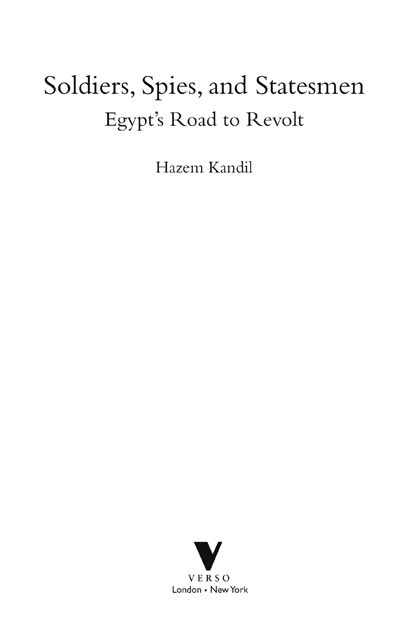
First published by Verso 2012
Hazim Kandil 2012, 2014
All rights reserved
The moral rights of the author have been asserted
1 3 5 7 9 10 8 6 4 2
Verso
UK: 6 Meard Street, London W1F 0EG
US: 20 Jay Street, Suite 1010, Brooklyn, NY 11201
www.versobooks.com
Verso is the imprint of New Left Books
British Library Cataloguing in Publication Data
A catalogue record for this book is available from the British Library
The Library of Congress Has Cataloged the Hardback Edition as Follows
Kandil, Hazem.
Soldiers, spies, and statesmen : Egypts road to revolt / Hazem Kandil.
p. cm.
Includes bibliographical references and index.
eBook ISBN: 978-1-84467-962-1 Hardcover ISBN: 978-1-84467-961-4 Trade Paperback: 978-1-78168-142-8
1. EgyptArmed ForcesPolitical activity. 2. Civil-military relationsEgypt.
3. EgyptPolitics and government19521970. 4. EgyptPolitics and government19701981. 5. EgyptPolitics and government1981 6. RevolutionsEgyptHistory20th century. 7. RevolutionsEgyptHistory21st century. 8. Police powerEgypt. I. Title.
DT107.827.K36 2012
322.50962dc23
2012027535
v3.1
To the heroes of Tahrir Square for demonstrating that
Egyptians can be everything they thought they were
We would see the defenders of the homeland sooner or later become its enemies, constantly holding a dagger over their fellow citizens, and there would come a time when we would hear them say to the oppressor of their country: If you order me to plunge my sword into my brothers breast or my fathers throat, and into my pregnant wifes entrails, I will do so, even though my right hand is unwilling.
Rousseau, Discourse on the Origin of Inequality, 1755
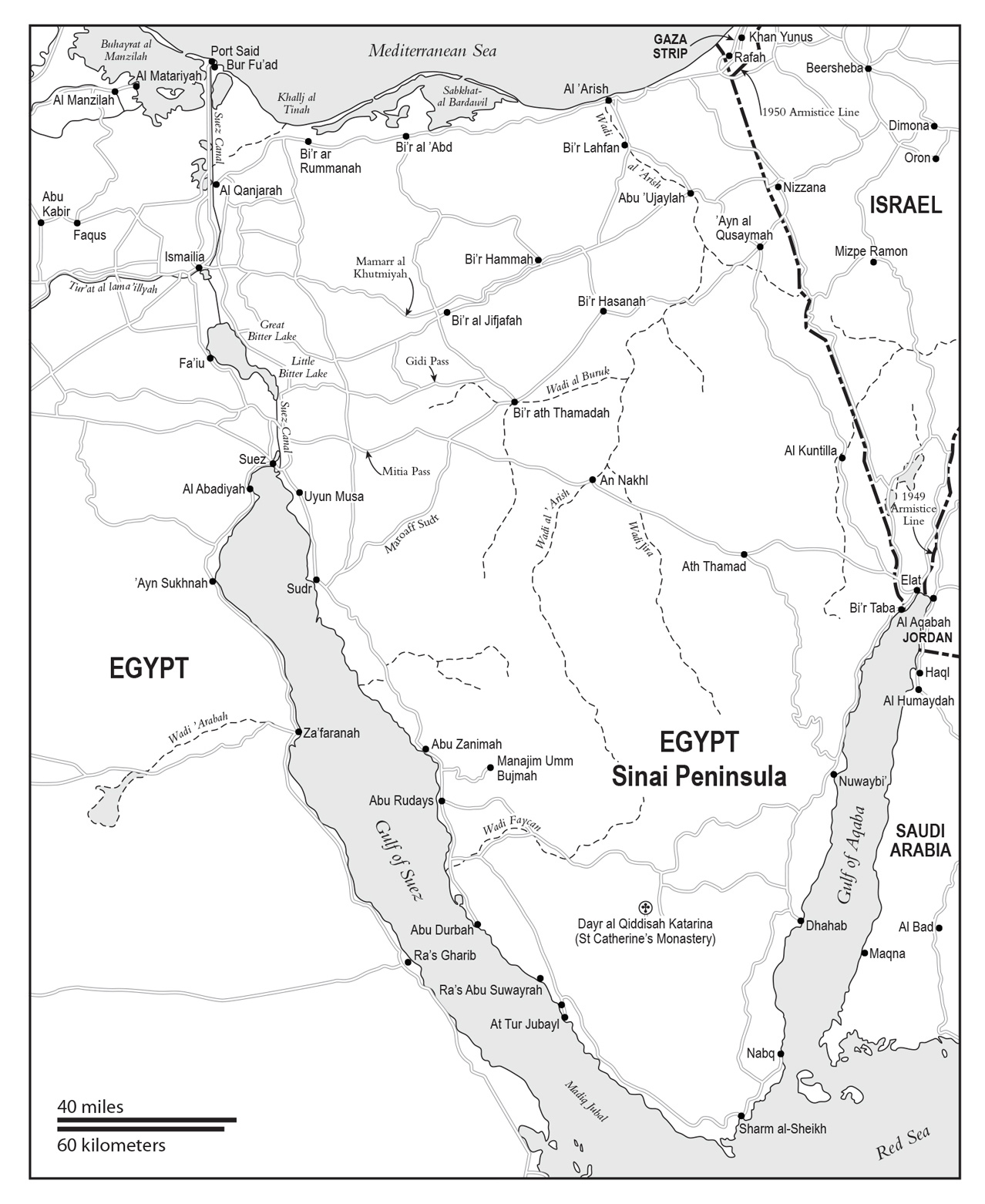

Revolutions break our heart whether they fail or succeed. To study revolution is to study how the masses awaken from their slumber and thrust themselves onto the center stage of their own history only to watch their aspirations either usurped or repressed. In the very best of cases, outcomes fall way below expectations. But as disheartening as studying revolutions may be, these rare and enigmatic episodes draw scholars like a magnet. The heroism of everyday life is simply too hard to resist.
Personally, I have been thinking and writing about the prospects of revolution in Egypt for as long as I can remember. Five years ago, I resolved to publish a book about it. But shortly before the manuscript was complete, words jumped right off the page and materialized before my eyes: Egyptians finally revolted. And between a tranquil university campus in Los Angeles and the barricades around Tahrir Square, the manuscript assumed its final form. This time the Angel of History was facing forward; this time the Owl of Minerva took flight at dawn. This was a book about history caught unexpectedly in real time.
The root causes of the January 25 Revolt in Egypt are as impossible to disentangle and rank as those inspiring any other revolution. At the very least one must admit that it is too early to determine why the millions who have been repressed for so long took to the streets on that particular day and vowed not to return home. Political failure, economic crises, ideological agitation, and new forms of organization all appear to have been hopelessly intertwined during these last fatal moments in the life of the regime. Likewise, predicting the outcome of this massive upheaval can only be a matter of speculation at this point; if a new regime did in fact emerge, it would take years to crystallize. So steering away from these formidableand probably futiletasks, this book aims at a much more modest and concrete goal, which is to understand what made the revolt possible once its preconditions had arrived. Instead of asking what triggered the uprising, I try to explain how its path was cleared. How was it possible for the people to defy their seemingly invincible dictatorship and get away with it? The answer in this case, as well as in countless others, is the position of the military and security forces. The fact that no revolt triumphs as long as the old regimes coercive organs are willing and capable of suppressing it is one of the few truisms in the field of revolution theory. One might even claim that revolution scholars agree on little else. It is such a commonsense assumption that manymistakenlytake it for granted.
But why did the agents of coercion fail to protect their political masters in Egypt, even though they had not been worn out by war (like in 1917 Russia) or civil strife (like in 2011 Libya)? The initial success of the revolt in Egypt challenges the simplistic assumption that the military and security forces are essentially the iron fists or heavy hands of authority, or other such metaphors that portray them as mere appendages rather than independent institutions with distinct corporate interests. The armed forces and the security establishment are full partners in any countrys ruling bloc. They work with rather than for the political apparatusno matter what the constitution says. And while the interests of the three partners usually coincide (projecting an image of unity), they are never identical.
Machiavelli wrote: Between the armed and unarmed man no proportion holds, and it is contrary to reason to expect that the armed man should voluntarily submit to him who is unarmed, or that the unarmed man should stand secure among armed retainers. This quintessential axiom rings true today as much as it did in the sixteenth century. Yet the conventional approach to analyzing the relationship between politicians and the custodians of violence is to assume that the military and security act just like other pressure groups, bargaining with civilians to promote their interests. But these powerful institutions have more at stake than other pressure groupstheir corporate interests are entwined in the mind of their members with the nations security (maybe even its existence), and they are therefore determined to compel politicians to assign absolute priority to questions of war against foreign and domestic enemies. And because force is their ultima ratio, unlike other social organizations, politicians cannot simply check their influence through legal and administrative means, or even by increasing their popular legitimacy.
So how can civilian leaders subordinate their mighty partners? They usually negotiate a power arrangement demarcating spheres of influence. And the relative weight of each of the three institutions is what renders one regime democratic, another military-dominated, and a third an authoritarian police state. Hence, analyzing any regime must begin by clarifying (or demystifying) the relationship within this power triangle.unrelenting power struggle between self-interested institutions within the state. It conceives the state not as a reified or monolithic body, but as an amalgam of institutions, each with its own power-maximizing agendas. Sometimes they are in conflict (no matter how muted), and at other times they are in alliance, but their aim is always to further their interests. Naturally, this competition results in power configurations that privilege some interests while repressing others, but even slight changes in domestic or geopolitical circumstances can disrupt the existing balance, precipitating a new round of struggle that finally results in new power formations. In this way, we can see that regime type reflects the prevailing balance of power at any given time, not an official hierarchy or ingrained practices.
Font size:
Interval:
Bookmark:
Similar books «Soldiers, spies, and statesmen: Egypts road to revolt»
Look at similar books to Soldiers, spies, and statesmen: Egypts road to revolt. We have selected literature similar in name and meaning in the hope of providing readers with more options to find new, interesting, not yet read works.
Discussion, reviews of the book Soldiers, spies, and statesmen: Egypts road to revolt and just readers' own opinions. Leave your comments, write what you think about the work, its meaning or the main characters. Specify what exactly you liked and what you didn't like, and why you think so.

